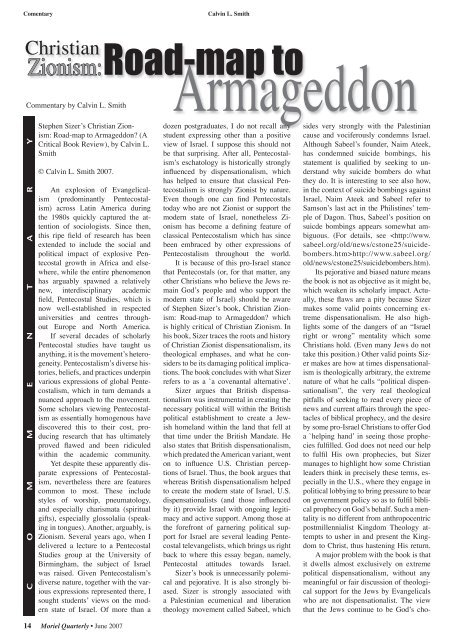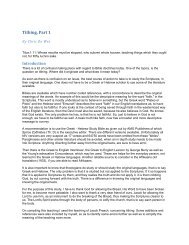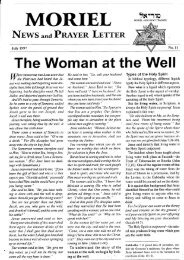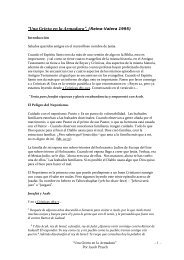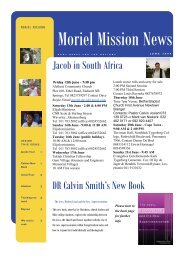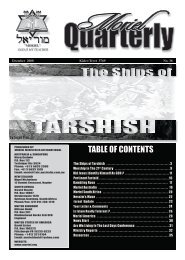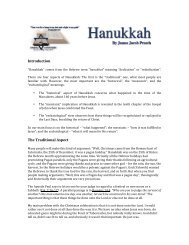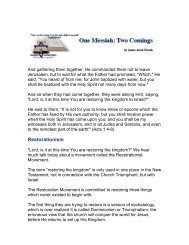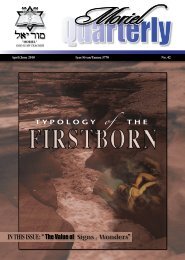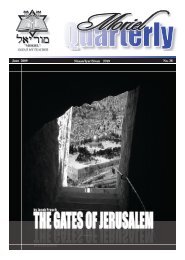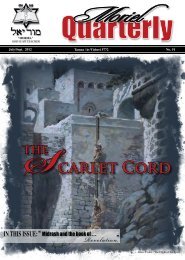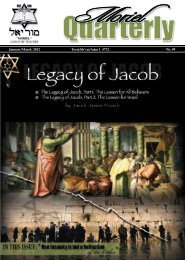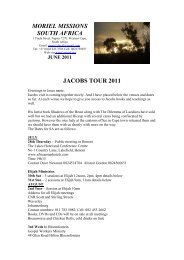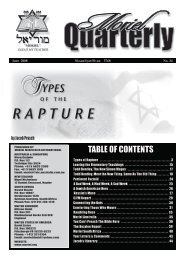Spiritual Warfare and Territorial Spirits (~5.5 MB) - Moriel Ministries
Spiritual Warfare and Territorial Spirits (~5.5 MB) - Moriel Ministries
Spiritual Warfare and Territorial Spirits (~5.5 MB) - Moriel Ministries
Create successful ePaper yourself
Turn your PDF publications into a flip-book with our unique Google optimized e-Paper software.
ComentaryCalvin L. SmithChristianZionism:Commentary by Calvin L. SmithRoad-map toArmageddonC O M M E N T A R YStephen Sizer’s Christian Zionism:Road-map to Armageddon? (ACritical Book Review), by Calvin L.Smith© Calvin L. Smith 2007.An explosion of Evangelicalism(predominantly Pentecostalism)across Latin America duringthe 1980s quickly captured the attentionof sociologists. Since then,this ripe field of research has beenextended to include the social <strong>and</strong>political impact of explosive Pentecostalgrowth in Africa <strong>and</strong> elsewhere,while the entire phenomenonhas arguably spawned a relativelynew, interdisciplinary academicfield, Pentecostal Studies, which isnow well-established in respecteduniversities <strong>and</strong> centres throughoutEurope <strong>and</strong> North America.If several decades of scholarlyPentecostal studies have taught usanything, it is the movement’s heterogeneity.Pentecostalism’s diverse histories,beliefs, <strong>and</strong> practices underpinvarious expressions of global Pentecostalism,which in turn dem<strong>and</strong>s anuanced approach to the movement.Some scholars viewing Pentecostalismas essentially homogenous havediscovered this to their cost, producingresearch that has ultimatelyproved flawed <strong>and</strong> been ridiculedwithin the academic community.Yet despite these apparently disparateexpressions of Pentecostalism,nevertheless there are featurescommon to most. These includestyles of worship, pneumatology,<strong>and</strong> especially charismata (spiritualgifts), especially glossolalia (speakingin tongues). Another, arguably, isZionism. Several years ago, when Idelivered a lecture to a PentecostalStudies group at the University ofBirmingham, the subject of Israelwas raised. Given Pentecostalism’sdiverse nature, together with the variousexpressions represented there, Isought students’ views on the modernstate of Israel. Of more than adozen postgraduates, I do not recall anystudent expressing other than a positiveview of Israel. I suppose this should notbe that surprising. After all, Pentecostalism’seschatology is historically stronglyinfluenced by dispensationalism, whichhas helped to ensure that classical Pentecostalismis strongly Zionist by nature.Even though one can find Pentecostalstoday who are not Zionist or support themodern state of Israel, nonetheless Zionismhas become a defining feature ofclassical Pentecostalism which has sincebeen embraced by other expressions ofPentecostalism throughout the world.It is because of this pro-Israel stancethat Pentecostals (or, for that matter, anyother Christians who believe the Jews remainGod’s people <strong>and</strong> who support themodern state of Israel) should be awareof Stephen Sizer’s book, Christian Zionism:Road-map to Armageddon? whichis highly critical of Christian Zionism. Inhis book, Sizer traces the roots <strong>and</strong> historyof Christian Zionist dispensationalism, itstheological emphases, <strong>and</strong> what he considersto be its damaging political implications.The book concludes with what Sizerrefers to as a `a covenantal alternative’.Sizer argues that British dispensationalismwas instrumental in creating thenecessary political will within the Britishpolitical establishment to create a Jewishhomel<strong>and</strong> within the l<strong>and</strong> that fell atthat time under the British M<strong>and</strong>ate. Healso states that British dispensationalism,which predated the American variant, wenton to influence U.S. Christian perceptionsof Israel. Thus, the book argues thatwhereas British dispensationalism helpedto create the modern state of Israel, U.S.dispensationalists (<strong>and</strong> those influencedby it) provide Israel with ongoing legitimacy<strong>and</strong> active support. Among those atthe forefront of garnering political supportfor Israel are several leading Pentecostaltelevangelists, which brings us rightback to where this essay began, namely,Pentecostal attitudes towards Israel.Sizer’s book is unnecessarily polemical<strong>and</strong> pejorative. It is also strongly biased.Sizer is strongly associated witha Palestinian ecumenical <strong>and</strong> liberationtheology movement called Sabeel, whichsides very strongly with the Palestiniancause <strong>and</strong> vociferously condemns Israel.Although Sabeel’s founder, Naim Ateek,has condemned suicide bombings, hisstatement is qualified by seeking to underst<strong>and</strong>why suicide bombers do whatthey do. It is interesting to see also how,in the context of suicide bombings againstIsrael, Naim Ateek <strong>and</strong> Sabeel refer toSamson’s last act in the Philistines’ templeof Dagon. Thus, Sabeel’s position onsuicde bombings appears somewhat ambiguous.(For details, see http://www.sabeel.org/old/news/cstone25/suicidebombers.htm).Its pejorative <strong>and</strong> biased nature meansthe book is not as objective as it might be,which weaken its scholarly impact. Actually,these flaws are a pity because Sizermakes some valid points concerning extremedispensationalism. He also highlightssome of the dangers of an “Israelright or wrong” mentality which someChristians hold. (Even many Jews do nottake this position.) Other valid points Sizermakes are how at times dispensationalismis theologically arbitrary, the extremenature of what he calls “political dispensationalism”,the very real theologicalpitfalls of seeking to read every piece ofnews <strong>and</strong> current affairs through the spectaclesof biblical prophecy, <strong>and</strong> the desireby some pro-Israel Christians to offer Goda `helping h<strong>and</strong>’ in seeing those propheciesfulfilled. God does not need our helpto fulfil His own prophecies, but Sizermanages to highlight how some Christianleaders think in precisely these terms, especiallyin the U.S., where they engage inpolitical lobbying to bring pressure to bearon government policy so as to fulfil biblicalprophecy on God’s behalf. Such a mentalityis no different from anthropocentricpostmillennialist Kingdom Theology attemptsto usher in <strong>and</strong> present the Kingdomto Christ, thus hastening His return.A major problem with the book is thatit dwells almost exclusively on extremepolitical dispensationalism, without anymeaningful or fair discussion of theologicalsupport for the Jews by Evangelicalswho are not dispensationalist. The viewthat the Jews continue to be God’s cho-14 <strong>Moriel</strong> Quarterly • June 2007


